HI5017 Managerial Accounting: Budgeting Research Report
VerifiedAdded on 2023/06/07
|19
|4505
|90
Report
AI Summary
This report delves into the realm of managerial accounting, specifically focusing on budgeting practices through an analysis of two research studies. The paper begins by defining budgeting and its importance in financial planning for individuals and organizations. It then examines two key research articles: "Budgetary Practices and Accountability Habitus (A Grounded Theory)" and "Practice Developments in Budgeting (An Overview and Research Perspective)." The report explores the purpose of each study, the research questions addressed, and a comparison of their findings, highlighting similarities and differences in their outcomes. Key concepts such as flexible and static budgets are discussed, along with the role of budgeting in achieving accountability, particularly in local government. Finally, the report examines the lessons that management accountants in Australian companies can learn from these studies. The report emphasizes the importance of budgeting as a tool for financial success and well-being, providing a detailed overview of the budgeting process, its applications, and the critical considerations for effective financial management.
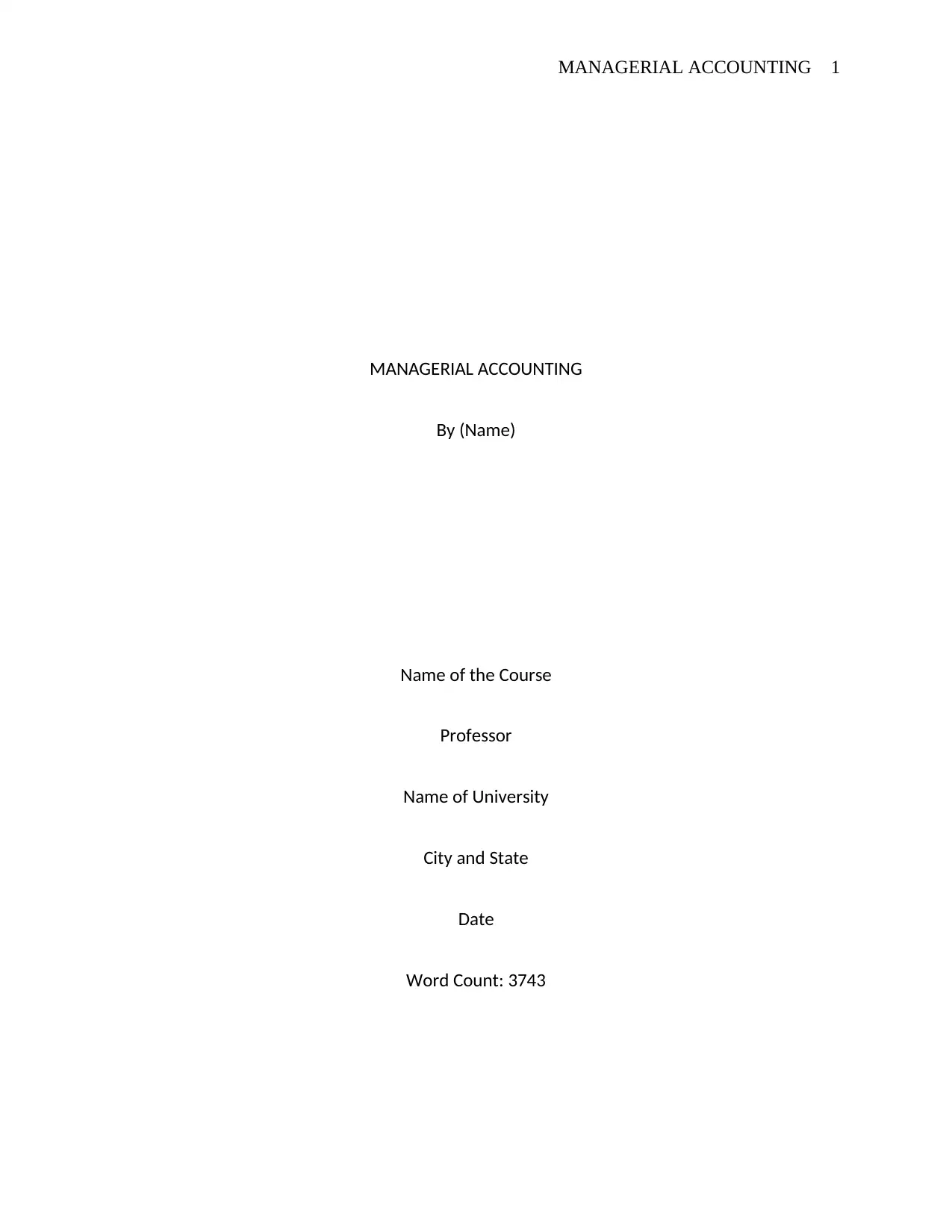
MANAGERIAL ACCOUNTING 1
MANAGERIAL ACCOUNTING
By (Name)
Name of the Course
Professor
Name of University
City and State
Date
Word Count: 3743
MANAGERIAL ACCOUNTING
By (Name)
Name of the Course
Professor
Name of University
City and State
Date
Word Count: 3743
Paraphrase This Document
Need a fresh take? Get an instant paraphrase of this document with our AI Paraphraser
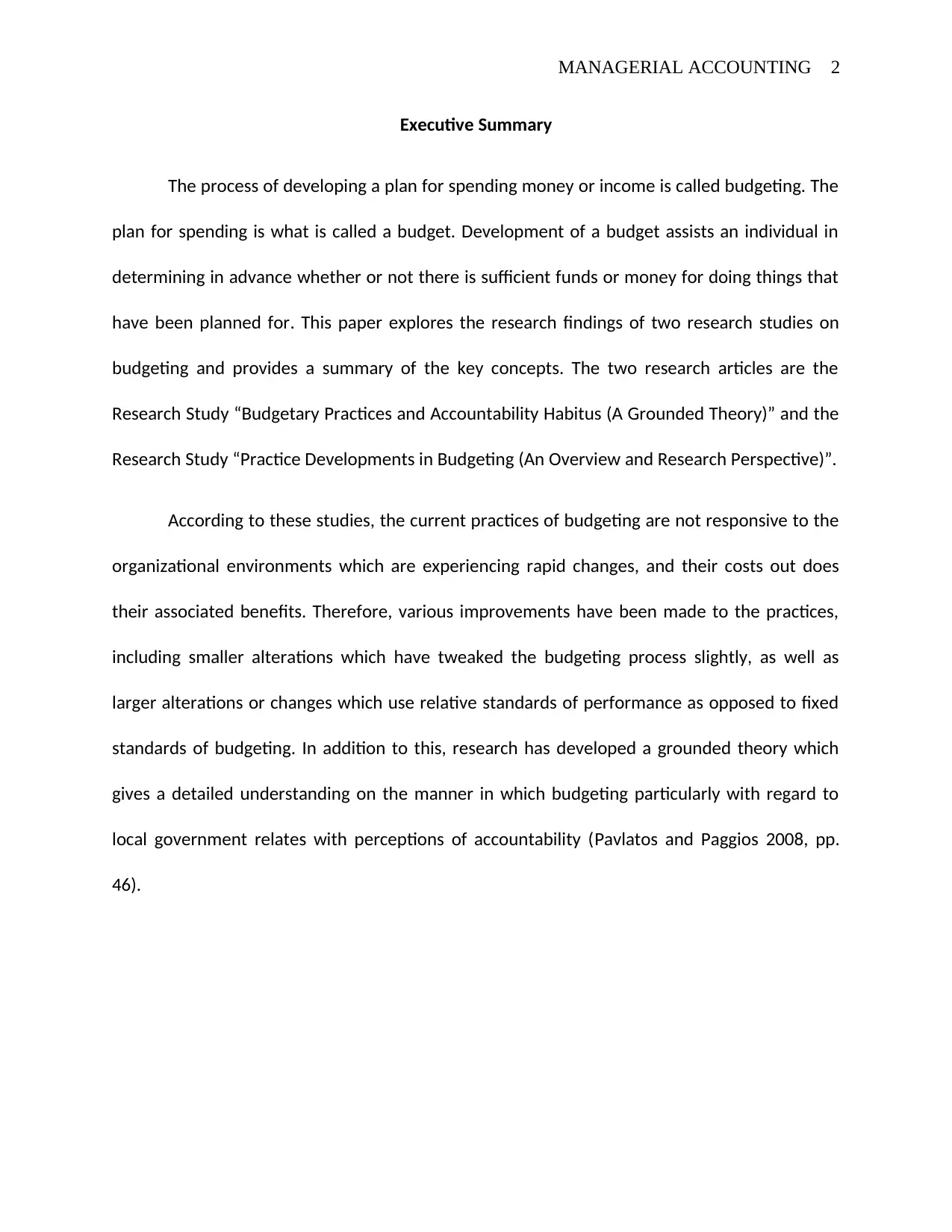
MANAGERIAL ACCOUNTING 2
Executive Summary
The process of developing a plan for spending money or income is called budgeting. The
plan for spending is what is called a budget. Development of a budget assists an individual in
determining in advance whether or not there is sufficient funds or money for doing things that
have been planned for. This paper explores the research findings of two research studies on
budgeting and provides a summary of the key concepts. The two research articles are the
Research Study “Budgetary Practices and Accountability Habitus (A Grounded Theory)” and the
Research Study “Practice Developments in Budgeting (An Overview and Research Perspective)”.
According to these studies, the current practices of budgeting are not responsive to the
organizational environments which are experiencing rapid changes, and their costs out does
their associated benefits. Therefore, various improvements have been made to the practices,
including smaller alterations which have tweaked the budgeting process slightly, as well as
larger alterations or changes which use relative standards of performance as opposed to fixed
standards of budgeting. In addition to this, research has developed a grounded theory which
gives a detailed understanding on the manner in which budgeting particularly with regard to
local government relates with perceptions of accountability (Pavlatos and Paggios 2008, pp.
46).
Executive Summary
The process of developing a plan for spending money or income is called budgeting. The
plan for spending is what is called a budget. Development of a budget assists an individual in
determining in advance whether or not there is sufficient funds or money for doing things that
have been planned for. This paper explores the research findings of two research studies on
budgeting and provides a summary of the key concepts. The two research articles are the
Research Study “Budgetary Practices and Accountability Habitus (A Grounded Theory)” and the
Research Study “Practice Developments in Budgeting (An Overview and Research Perspective)”.
According to these studies, the current practices of budgeting are not responsive to the
organizational environments which are experiencing rapid changes, and their costs out does
their associated benefits. Therefore, various improvements have been made to the practices,
including smaller alterations which have tweaked the budgeting process slightly, as well as
larger alterations or changes which use relative standards of performance as opposed to fixed
standards of budgeting. In addition to this, research has developed a grounded theory which
gives a detailed understanding on the manner in which budgeting particularly with regard to
local government relates with perceptions of accountability (Pavlatos and Paggios 2008, pp.
46).
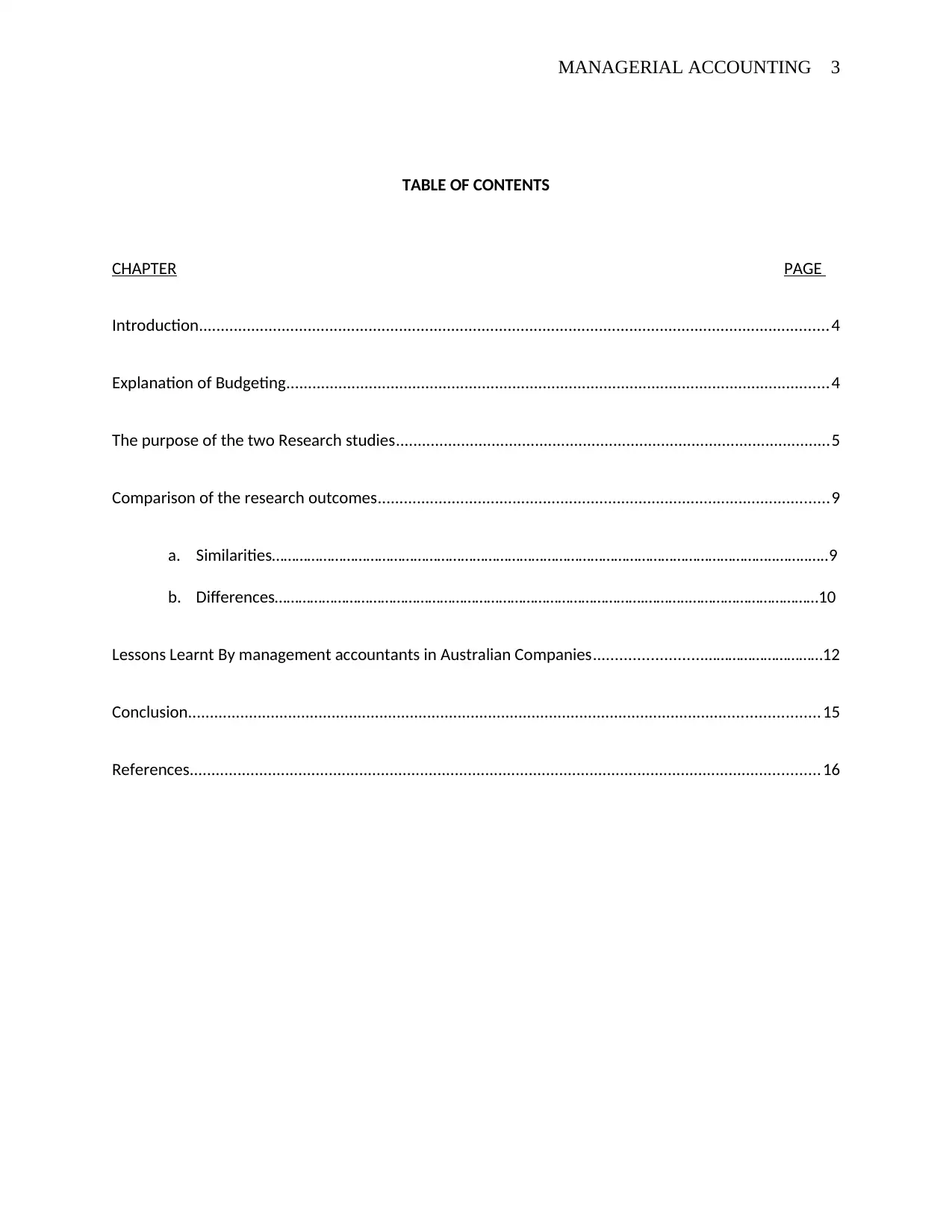
MANAGERIAL ACCOUNTING 3
TABLE OF CONTENTS
CHAPTER PAGE
Introduction.................................................................................................................................................4
Explanation of Budgeting.............................................................................................................................4
The purpose of the two Research studies....................................................................................................5
Comparison of the research outcomes........................................................................................................9
a. Similarities………………………………………………………………………………………………………………..……..…..9
b. Differences………………………………………………………………………………….………..……………………………10
Lessons Learnt By management accountants in Australian Companies.........................…………………………12
Conclusion.................................................................................................................................................15
References.................................................................................................................................................16
TABLE OF CONTENTS
CHAPTER PAGE
Introduction.................................................................................................................................................4
Explanation of Budgeting.............................................................................................................................4
The purpose of the two Research studies....................................................................................................5
Comparison of the research outcomes........................................................................................................9
a. Similarities………………………………………………………………………………………………………………..……..…..9
b. Differences………………………………………………………………………………….………..……………………………10
Lessons Learnt By management accountants in Australian Companies.........................…………………………12
Conclusion.................................................................................................................................................15
References.................................................................................................................................................16
⊘ This is a preview!⊘
Do you want full access?
Subscribe today to unlock all pages.

Trusted by 1+ million students worldwide
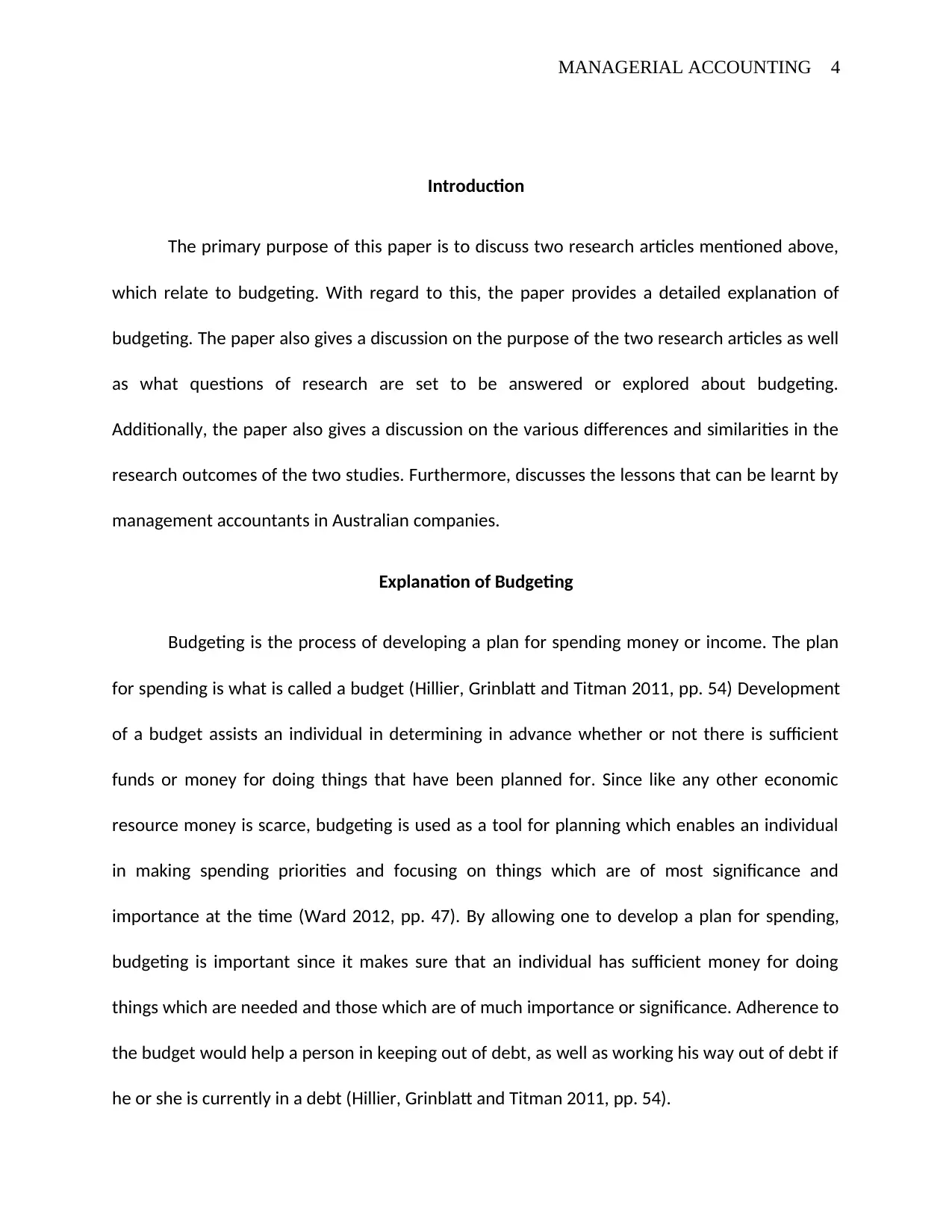
MANAGERIAL ACCOUNTING 4
Introduction
The primary purpose of this paper is to discuss two research articles mentioned above,
which relate to budgeting. With regard to this, the paper provides a detailed explanation of
budgeting. The paper also gives a discussion on the purpose of the two research articles as well
as what questions of research are set to be answered or explored about budgeting.
Additionally, the paper also gives a discussion on the various differences and similarities in the
research outcomes of the two studies. Furthermore, discusses the lessons that can be learnt by
management accountants in Australian companies.
Explanation of Budgeting
Budgeting is the process of developing a plan for spending money or income. The plan
for spending is what is called a budget (Hillier, Grinblatt and Titman 2011, pp. 54) Development
of a budget assists an individual in determining in advance whether or not there is sufficient
funds or money for doing things that have been planned for. Since like any other economic
resource money is scarce, budgeting is used as a tool for planning which enables an individual
in making spending priorities and focusing on things which are of most significance and
importance at the time (Ward 2012, pp. 47). By allowing one to develop a plan for spending,
budgeting is important since it makes sure that an individual has sufficient money for doing
things which are needed and those which are of much importance or significance. Adherence to
the budget would help a person in keeping out of debt, as well as working his way out of debt if
he or she is currently in a debt (Hillier, Grinblatt and Titman 2011, pp. 54).
Introduction
The primary purpose of this paper is to discuss two research articles mentioned above,
which relate to budgeting. With regard to this, the paper provides a detailed explanation of
budgeting. The paper also gives a discussion on the purpose of the two research articles as well
as what questions of research are set to be answered or explored about budgeting.
Additionally, the paper also gives a discussion on the various differences and similarities in the
research outcomes of the two studies. Furthermore, discusses the lessons that can be learnt by
management accountants in Australian companies.
Explanation of Budgeting
Budgeting is the process of developing a plan for spending money or income. The plan
for spending is what is called a budget (Hillier, Grinblatt and Titman 2011, pp. 54) Development
of a budget assists an individual in determining in advance whether or not there is sufficient
funds or money for doing things that have been planned for. Since like any other economic
resource money is scarce, budgeting is used as a tool for planning which enables an individual
in making spending priorities and focusing on things which are of most significance and
importance at the time (Ward 2012, pp. 47). By allowing one to develop a plan for spending,
budgeting is important since it makes sure that an individual has sufficient money for doing
things which are needed and those which are of much importance or significance. Adherence to
the budget would help a person in keeping out of debt, as well as working his way out of debt if
he or she is currently in a debt (Hillier, Grinblatt and Titman 2011, pp. 54).
Paraphrase This Document
Need a fresh take? Get an instant paraphrase of this document with our AI Paraphraser
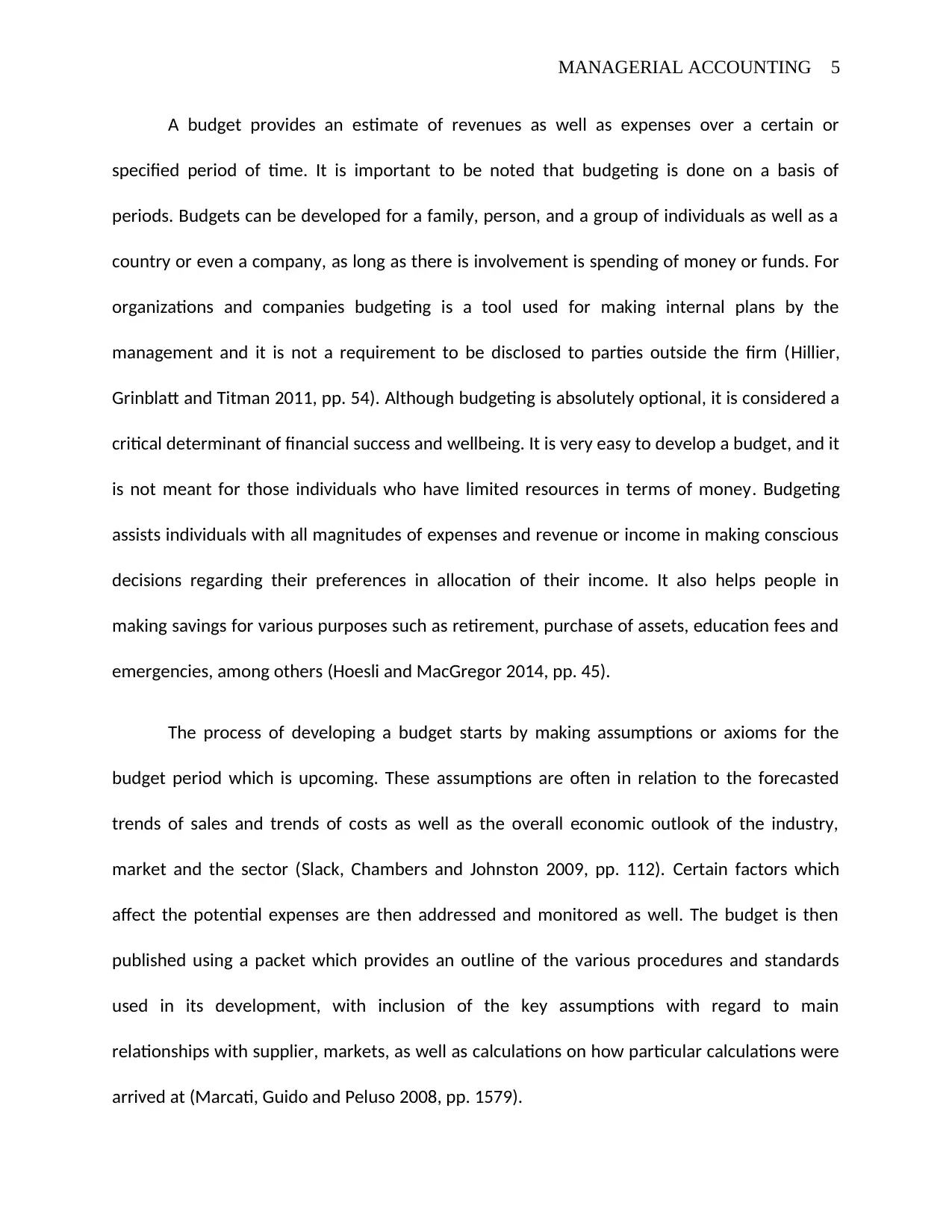
MANAGERIAL ACCOUNTING 5
A budget provides an estimate of revenues as well as expenses over a certain or
specified period of time. It is important to be noted that budgeting is done on a basis of
periods. Budgets can be developed for a family, person, and a group of individuals as well as a
country or even a company, as long as there is involvement is spending of money or funds. For
organizations and companies budgeting is a tool used for making internal plans by the
management and it is not a requirement to be disclosed to parties outside the firm (Hillier,
Grinblatt and Titman 2011, pp. 54). Although budgeting is absolutely optional, it is considered a
critical determinant of financial success and wellbeing. It is very easy to develop a budget, and it
is not meant for those individuals who have limited resources in terms of money. Budgeting
assists individuals with all magnitudes of expenses and revenue or income in making conscious
decisions regarding their preferences in allocation of their income. It also helps people in
making savings for various purposes such as retirement, purchase of assets, education fees and
emergencies, among others (Hoesli and MacGregor 2014, pp. 45).
The process of developing a budget starts by making assumptions or axioms for the
budget period which is upcoming. These assumptions are often in relation to the forecasted
trends of sales and trends of costs as well as the overall economic outlook of the industry,
market and the sector (Slack, Chambers and Johnston 2009, pp. 112). Certain factors which
affect the potential expenses are then addressed and monitored as well. The budget is then
published using a packet which provides an outline of the various procedures and standards
used in its development, with inclusion of the key assumptions with regard to main
relationships with supplier, markets, as well as calculations on how particular calculations were
arrived at (Marcati, Guido and Peluso 2008, pp. 1579).
A budget provides an estimate of revenues as well as expenses over a certain or
specified period of time. It is important to be noted that budgeting is done on a basis of
periods. Budgets can be developed for a family, person, and a group of individuals as well as a
country or even a company, as long as there is involvement is spending of money or funds. For
organizations and companies budgeting is a tool used for making internal plans by the
management and it is not a requirement to be disclosed to parties outside the firm (Hillier,
Grinblatt and Titman 2011, pp. 54). Although budgeting is absolutely optional, it is considered a
critical determinant of financial success and wellbeing. It is very easy to develop a budget, and it
is not meant for those individuals who have limited resources in terms of money. Budgeting
assists individuals with all magnitudes of expenses and revenue or income in making conscious
decisions regarding their preferences in allocation of their income. It also helps people in
making savings for various purposes such as retirement, purchase of assets, education fees and
emergencies, among others (Hoesli and MacGregor 2014, pp. 45).
The process of developing a budget starts by making assumptions or axioms for the
budget period which is upcoming. These assumptions are often in relation to the forecasted
trends of sales and trends of costs as well as the overall economic outlook of the industry,
market and the sector (Slack, Chambers and Johnston 2009, pp. 112). Certain factors which
affect the potential expenses are then addressed and monitored as well. The budget is then
published using a packet which provides an outline of the various procedures and standards
used in its development, with inclusion of the key assumptions with regard to main
relationships with supplier, markets, as well as calculations on how particular calculations were
arrived at (Marcati, Guido and Peluso 2008, pp. 1579).
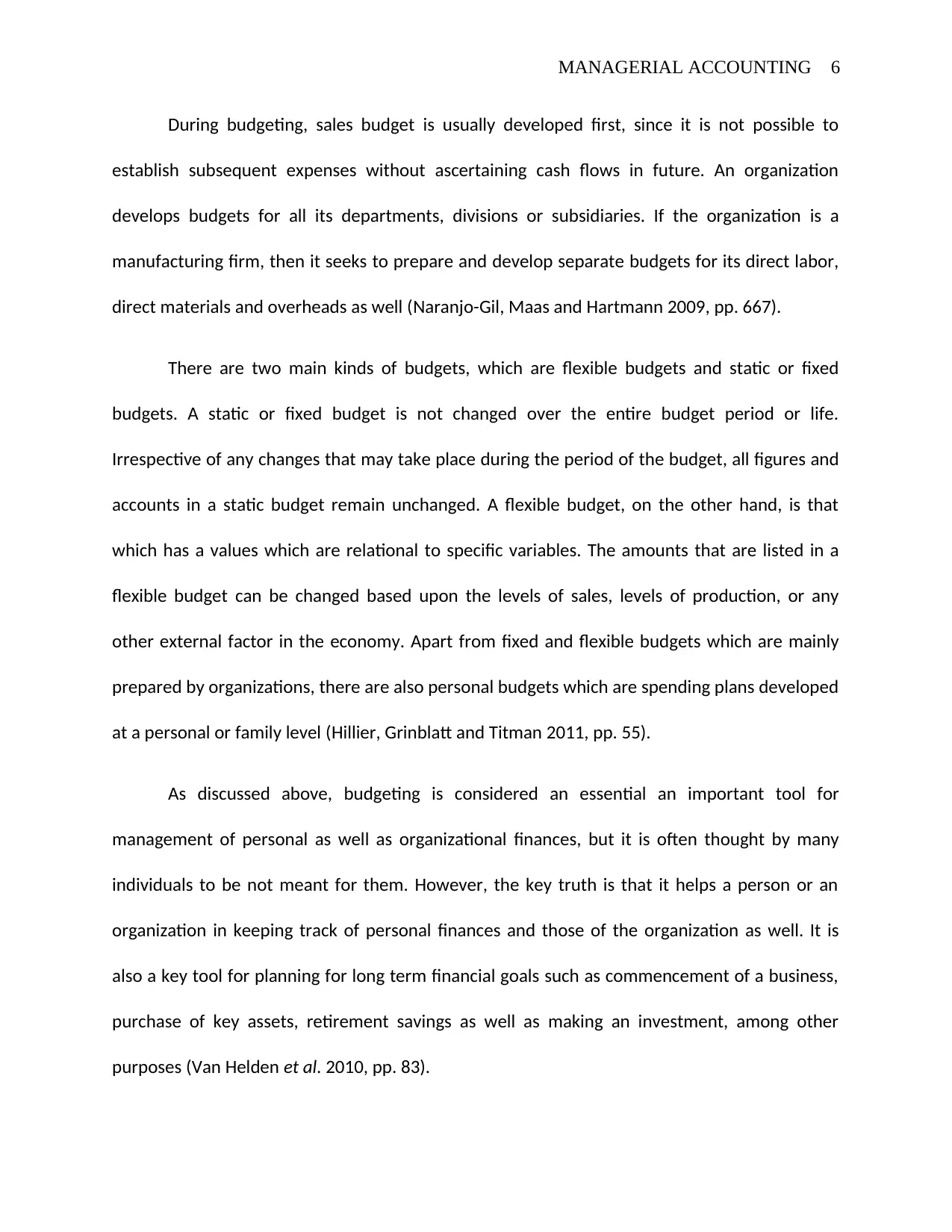
MANAGERIAL ACCOUNTING 6
During budgeting, sales budget is usually developed first, since it is not possible to
establish subsequent expenses without ascertaining cash flows in future. An organization
develops budgets for all its departments, divisions or subsidiaries. If the organization is a
manufacturing firm, then it seeks to prepare and develop separate budgets for its direct labor,
direct materials and overheads as well (Naranjo-Gil, Maas and Hartmann 2009, pp. 667).
There are two main kinds of budgets, which are flexible budgets and static or fixed
budgets. A static or fixed budget is not changed over the entire budget period or life.
Irrespective of any changes that may take place during the period of the budget, all figures and
accounts in a static budget remain unchanged. A flexible budget, on the other hand, is that
which has a values which are relational to specific variables. The amounts that are listed in a
flexible budget can be changed based upon the levels of sales, levels of production, or any
other external factor in the economy. Apart from fixed and flexible budgets which are mainly
prepared by organizations, there are also personal budgets which are spending plans developed
at a personal or family level (Hillier, Grinblatt and Titman 2011, pp. 55).
As discussed above, budgeting is considered an essential an important tool for
management of personal as well as organizational finances, but it is often thought by many
individuals to be not meant for them. However, the key truth is that it helps a person or an
organization in keeping track of personal finances and those of the organization as well. It is
also a key tool for planning for long term financial goals such as commencement of a business,
purchase of key assets, retirement savings as well as making an investment, among other
purposes (Van Helden et al. 2010, pp. 83).
During budgeting, sales budget is usually developed first, since it is not possible to
establish subsequent expenses without ascertaining cash flows in future. An organization
develops budgets for all its departments, divisions or subsidiaries. If the organization is a
manufacturing firm, then it seeks to prepare and develop separate budgets for its direct labor,
direct materials and overheads as well (Naranjo-Gil, Maas and Hartmann 2009, pp. 667).
There are two main kinds of budgets, which are flexible budgets and static or fixed
budgets. A static or fixed budget is not changed over the entire budget period or life.
Irrespective of any changes that may take place during the period of the budget, all figures and
accounts in a static budget remain unchanged. A flexible budget, on the other hand, is that
which has a values which are relational to specific variables. The amounts that are listed in a
flexible budget can be changed based upon the levels of sales, levels of production, or any
other external factor in the economy. Apart from fixed and flexible budgets which are mainly
prepared by organizations, there are also personal budgets which are spending plans developed
at a personal or family level (Hillier, Grinblatt and Titman 2011, pp. 55).
As discussed above, budgeting is considered an essential an important tool for
management of personal as well as organizational finances, but it is often thought by many
individuals to be not meant for them. However, the key truth is that it helps a person or an
organization in keeping track of personal finances and those of the organization as well. It is
also a key tool for planning for long term financial goals such as commencement of a business,
purchase of key assets, retirement savings as well as making an investment, among other
purposes (Van Helden et al. 2010, pp. 83).
⊘ This is a preview!⊘
Do you want full access?
Subscribe today to unlock all pages.

Trusted by 1+ million students worldwide
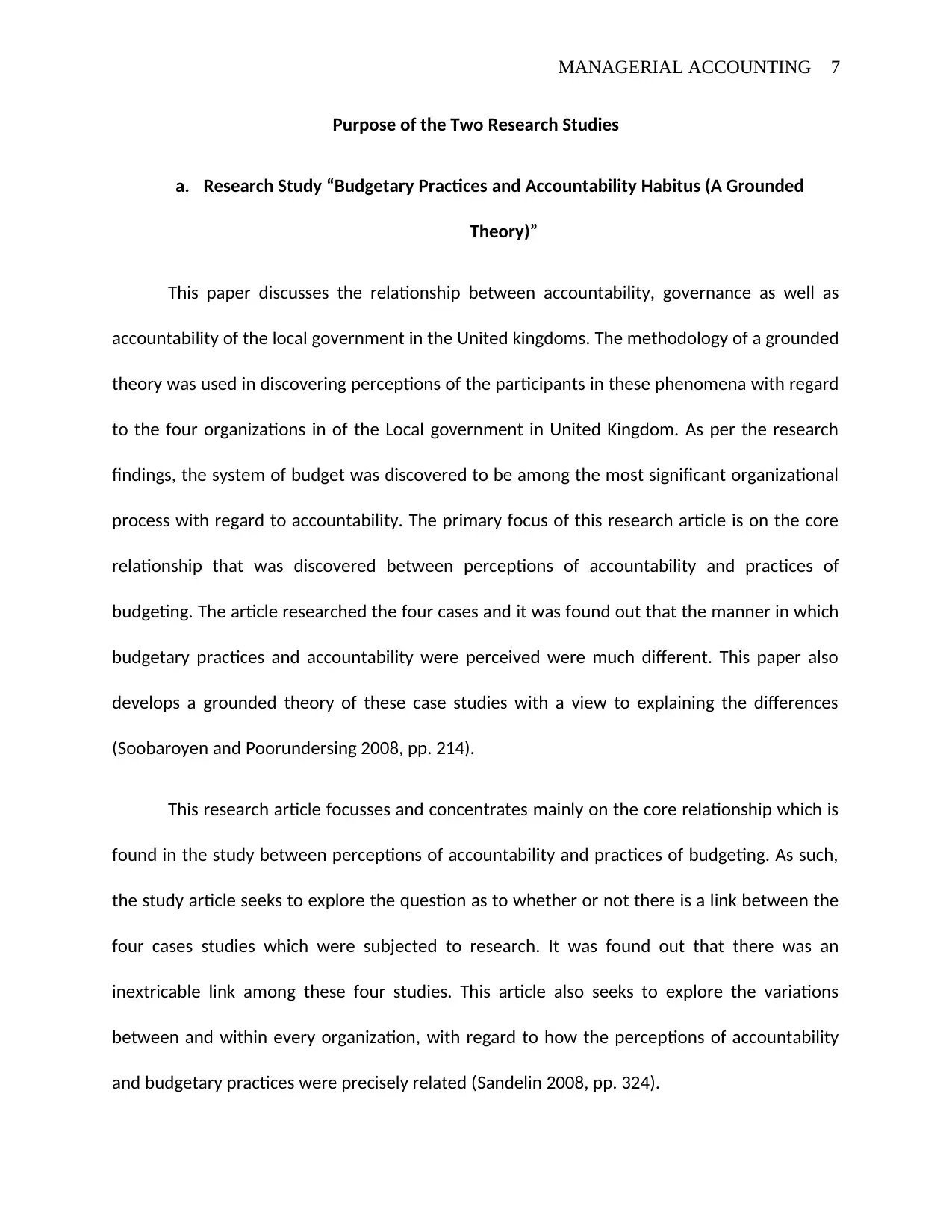
MANAGERIAL ACCOUNTING 7
Purpose of the Two Research Studies
a. Research Study “Budgetary Practices and Accountability Habitus (A Grounded
Theory)”
This paper discusses the relationship between accountability, governance as well as
accountability of the local government in the United kingdoms. The methodology of a grounded
theory was used in discovering perceptions of the participants in these phenomena with regard
to the four organizations in of the Local government in United Kingdom. As per the research
findings, the system of budget was discovered to be among the most significant organizational
process with regard to accountability. The primary focus of this research article is on the core
relationship that was discovered between perceptions of accountability and practices of
budgeting. The article researched the four cases and it was found out that the manner in which
budgetary practices and accountability were perceived were much different. This paper also
develops a grounded theory of these case studies with a view to explaining the differences
(Soobaroyen and Poorundersing 2008, pp. 214).
This research article focusses and concentrates mainly on the core relationship which is
found in the study between perceptions of accountability and practices of budgeting. As such,
the study article seeks to explore the question as to whether or not there is a link between the
four cases studies which were subjected to research. It was found out that there was an
inextricable link among these four studies. This article also seeks to explore the variations
between and within every organization, with regard to how the perceptions of accountability
and budgetary practices were precisely related (Sandelin 2008, pp. 324).
Purpose of the Two Research Studies
a. Research Study “Budgetary Practices and Accountability Habitus (A Grounded
Theory)”
This paper discusses the relationship between accountability, governance as well as
accountability of the local government in the United kingdoms. The methodology of a grounded
theory was used in discovering perceptions of the participants in these phenomena with regard
to the four organizations in of the Local government in United Kingdom. As per the research
findings, the system of budget was discovered to be among the most significant organizational
process with regard to accountability. The primary focus of this research article is on the core
relationship that was discovered between perceptions of accountability and practices of
budgeting. The article researched the four cases and it was found out that the manner in which
budgetary practices and accountability were perceived were much different. This paper also
develops a grounded theory of these case studies with a view to explaining the differences
(Soobaroyen and Poorundersing 2008, pp. 214).
This research article focusses and concentrates mainly on the core relationship which is
found in the study between perceptions of accountability and practices of budgeting. As such,
the study article seeks to explore the question as to whether or not there is a link between the
four cases studies which were subjected to research. It was found out that there was an
inextricable link among these four studies. This article also seeks to explore the variations
between and within every organization, with regard to how the perceptions of accountability
and budgetary practices were precisely related (Sandelin 2008, pp. 324).
Paraphrase This Document
Need a fresh take? Get an instant paraphrase of this document with our AI Paraphraser
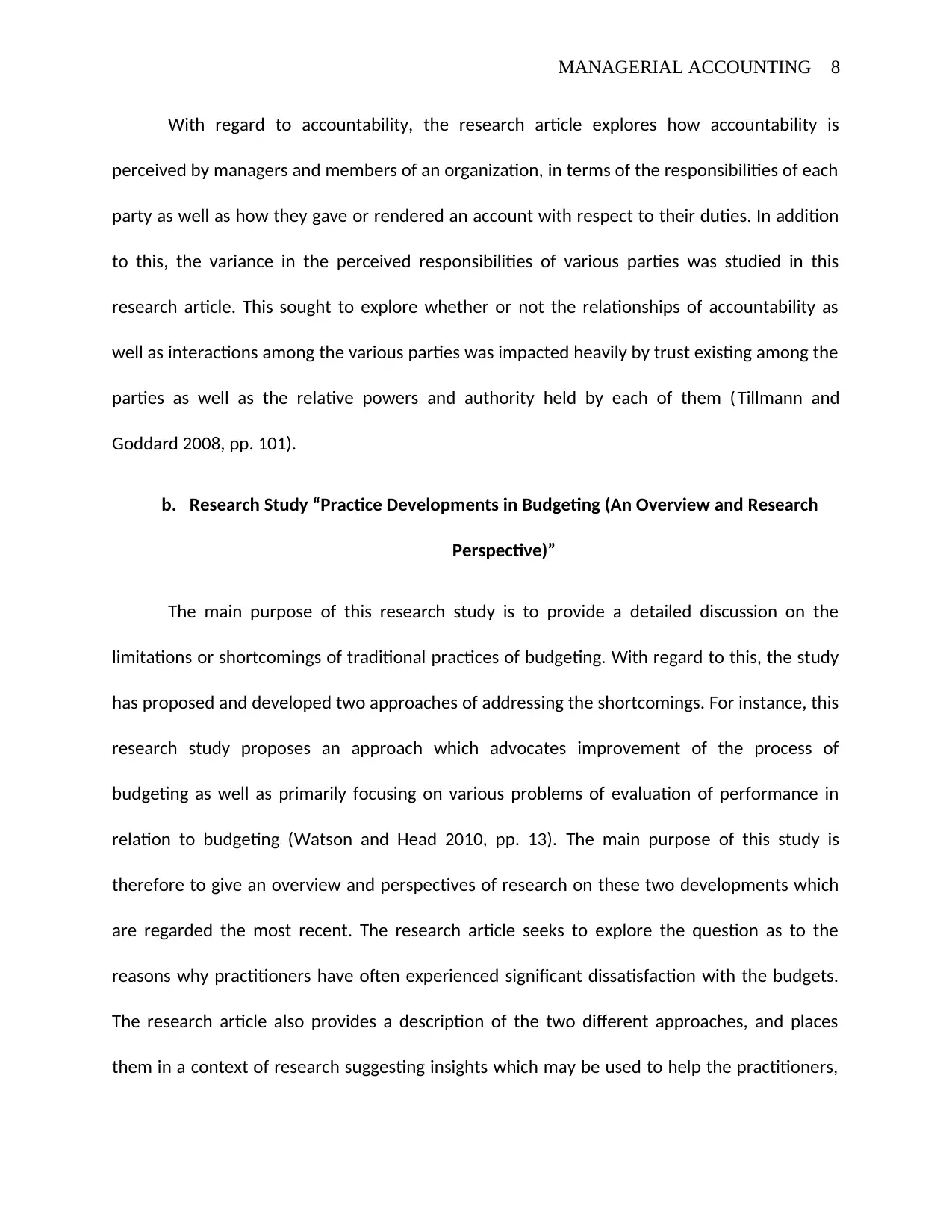
MANAGERIAL ACCOUNTING 8
With regard to accountability, the research article explores how accountability is
perceived by managers and members of an organization, in terms of the responsibilities of each
party as well as how they gave or rendered an account with respect to their duties. In addition
to this, the variance in the perceived responsibilities of various parties was studied in this
research article. This sought to explore whether or not the relationships of accountability as
well as interactions among the various parties was impacted heavily by trust existing among the
parties as well as the relative powers and authority held by each of them (Tillmann and
Goddard 2008, pp. 101).
b. Research Study “Practice Developments in Budgeting (An Overview and Research
Perspective)”
The main purpose of this research study is to provide a detailed discussion on the
limitations or shortcomings of traditional practices of budgeting. With regard to this, the study
has proposed and developed two approaches of addressing the shortcomings. For instance, this
research study proposes an approach which advocates improvement of the process of
budgeting as well as primarily focusing on various problems of evaluation of performance in
relation to budgeting (Watson and Head 2010, pp. 13). The main purpose of this study is
therefore to give an overview and perspectives of research on these two developments which
are regarded the most recent. The research article seeks to explore the question as to the
reasons why practitioners have often experienced significant dissatisfaction with the budgets.
The research article also provides a description of the two different approaches, and places
them in a context of research suggesting insights which may be used to help the practitioners,
With regard to accountability, the research article explores how accountability is
perceived by managers and members of an organization, in terms of the responsibilities of each
party as well as how they gave or rendered an account with respect to their duties. In addition
to this, the variance in the perceived responsibilities of various parties was studied in this
research article. This sought to explore whether or not the relationships of accountability as
well as interactions among the various parties was impacted heavily by trust existing among the
parties as well as the relative powers and authority held by each of them (Tillmann and
Goddard 2008, pp. 101).
b. Research Study “Practice Developments in Budgeting (An Overview and Research
Perspective)”
The main purpose of this research study is to provide a detailed discussion on the
limitations or shortcomings of traditional practices of budgeting. With regard to this, the study
has proposed and developed two approaches of addressing the shortcomings. For instance, this
research study proposes an approach which advocates improvement of the process of
budgeting as well as primarily focusing on various problems of evaluation of performance in
relation to budgeting (Watson and Head 2010, pp. 13). The main purpose of this study is
therefore to give an overview and perspectives of research on these two developments which
are regarded the most recent. The research article seeks to explore the question as to the
reasons why practitioners have often experienced significant dissatisfaction with the budgets.
The research article also provides a description of the two different approaches, and places
them in a context of research suggesting insights which may be used to help the practitioners,
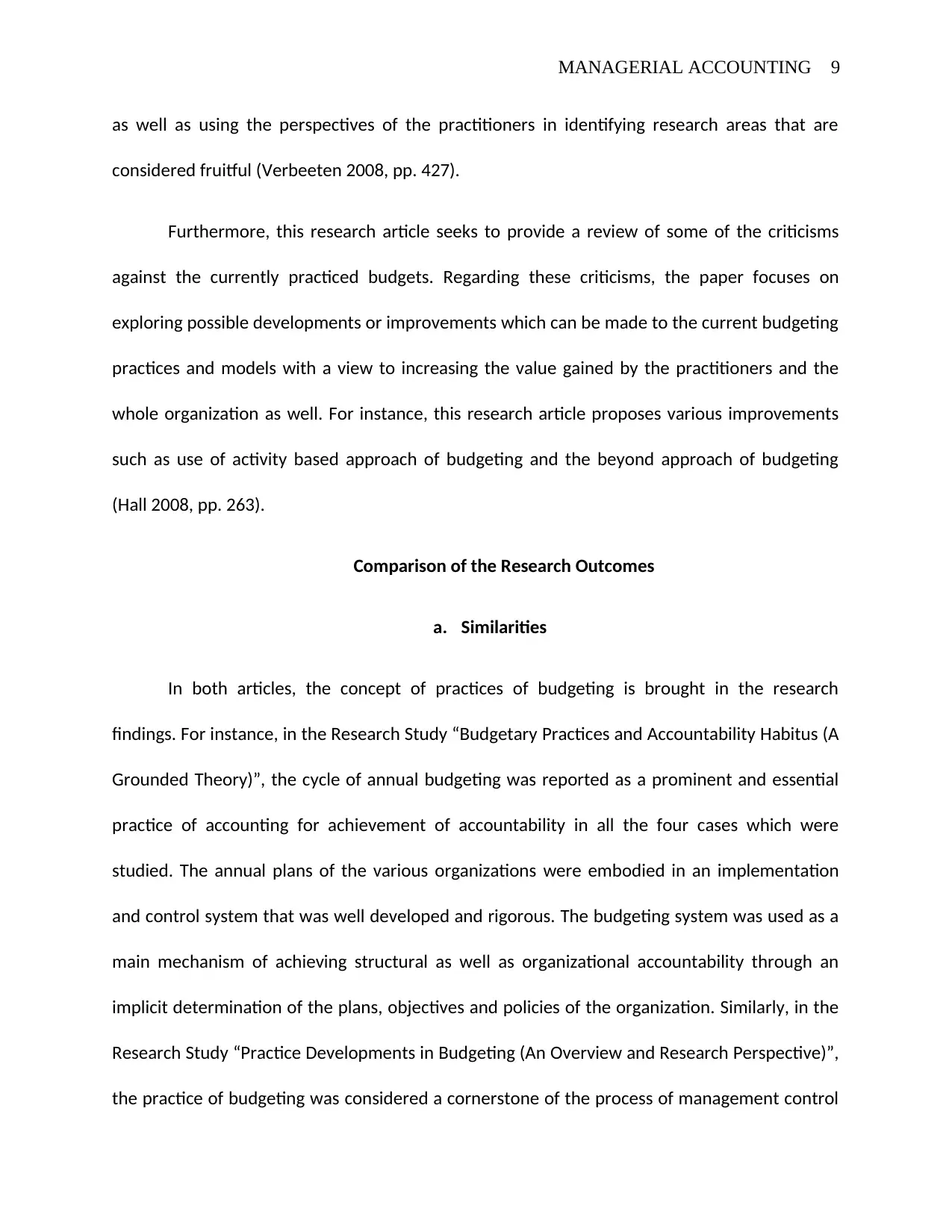
MANAGERIAL ACCOUNTING 9
as well as using the perspectives of the practitioners in identifying research areas that are
considered fruitful (Verbeeten 2008, pp. 427).
Furthermore, this research article seeks to provide a review of some of the criticisms
against the currently practiced budgets. Regarding these criticisms, the paper focuses on
exploring possible developments or improvements which can be made to the current budgeting
practices and models with a view to increasing the value gained by the practitioners and the
whole organization as well. For instance, this research article proposes various improvements
such as use of activity based approach of budgeting and the beyond approach of budgeting
(Hall 2008, pp. 263).
Comparison of the Research Outcomes
a. Similarities
In both articles, the concept of practices of budgeting is brought in the research
findings. For instance, in the Research Study “Budgetary Practices and Accountability Habitus (A
Grounded Theory)”, the cycle of annual budgeting was reported as a prominent and essential
practice of accounting for achievement of accountability in all the four cases which were
studied. The annual plans of the various organizations were embodied in an implementation
and control system that was well developed and rigorous. The budgeting system was used as a
main mechanism of achieving structural as well as organizational accountability through an
implicit determination of the plans, objectives and policies of the organization. Similarly, in the
Research Study “Practice Developments in Budgeting (An Overview and Research Perspective)”,
the practice of budgeting was considered a cornerstone of the process of management control
as well as using the perspectives of the practitioners in identifying research areas that are
considered fruitful (Verbeeten 2008, pp. 427).
Furthermore, this research article seeks to provide a review of some of the criticisms
against the currently practiced budgets. Regarding these criticisms, the paper focuses on
exploring possible developments or improvements which can be made to the current budgeting
practices and models with a view to increasing the value gained by the practitioners and the
whole organization as well. For instance, this research article proposes various improvements
such as use of activity based approach of budgeting and the beyond approach of budgeting
(Hall 2008, pp. 263).
Comparison of the Research Outcomes
a. Similarities
In both articles, the concept of practices of budgeting is brought in the research
findings. For instance, in the Research Study “Budgetary Practices and Accountability Habitus (A
Grounded Theory)”, the cycle of annual budgeting was reported as a prominent and essential
practice of accounting for achievement of accountability in all the four cases which were
studied. The annual plans of the various organizations were embodied in an implementation
and control system that was well developed and rigorous. The budgeting system was used as a
main mechanism of achieving structural as well as organizational accountability through an
implicit determination of the plans, objectives and policies of the organization. Similarly, in the
Research Study “Practice Developments in Budgeting (An Overview and Research Perspective)”,
the practice of budgeting was considered a cornerstone of the process of management control
⊘ This is a preview!⊘
Do you want full access?
Subscribe today to unlock all pages.

Trusted by 1+ million students worldwide
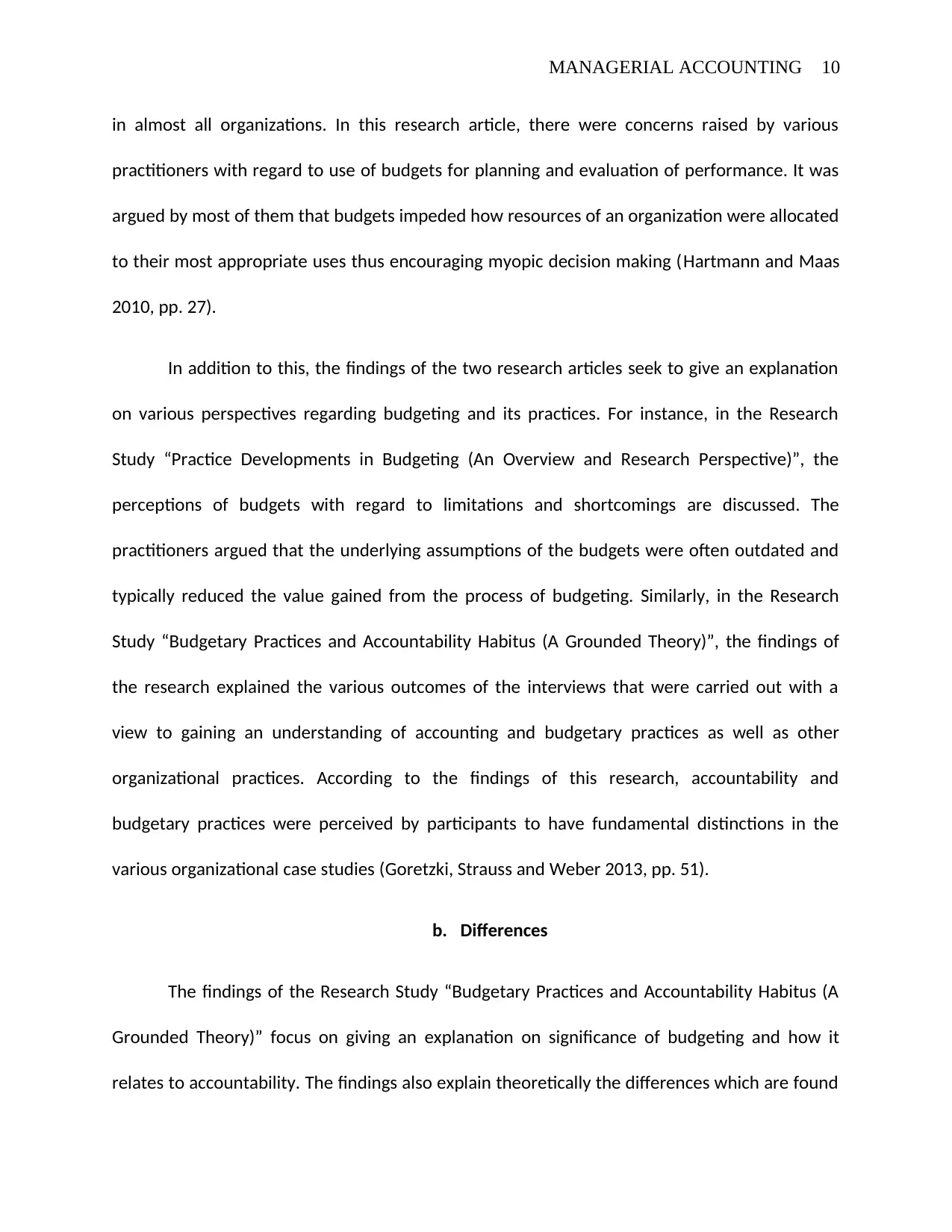
MANAGERIAL ACCOUNTING 10
in almost all organizations. In this research article, there were concerns raised by various
practitioners with regard to use of budgets for planning and evaluation of performance. It was
argued by most of them that budgets impeded how resources of an organization were allocated
to their most appropriate uses thus encouraging myopic decision making (Hartmann and Maas
2010, pp. 27).
In addition to this, the findings of the two research articles seek to give an explanation
on various perspectives regarding budgeting and its practices. For instance, in the Research
Study “Practice Developments in Budgeting (An Overview and Research Perspective)”, the
perceptions of budgets with regard to limitations and shortcomings are discussed. The
practitioners argued that the underlying assumptions of the budgets were often outdated and
typically reduced the value gained from the process of budgeting. Similarly, in the Research
Study “Budgetary Practices and Accountability Habitus (A Grounded Theory)”, the findings of
the research explained the various outcomes of the interviews that were carried out with a
view to gaining an understanding of accounting and budgetary practices as well as other
organizational practices. According to the findings of this research, accountability and
budgetary practices were perceived by participants to have fundamental distinctions in the
various organizational case studies (Goretzki, Strauss and Weber 2013, pp. 51).
b. Differences
The findings of the Research Study “Budgetary Practices and Accountability Habitus (A
Grounded Theory)” focus on giving an explanation on significance of budgeting and how it
relates to accountability. The findings also explain theoretically the differences which are found
in almost all organizations. In this research article, there were concerns raised by various
practitioners with regard to use of budgets for planning and evaluation of performance. It was
argued by most of them that budgets impeded how resources of an organization were allocated
to their most appropriate uses thus encouraging myopic decision making (Hartmann and Maas
2010, pp. 27).
In addition to this, the findings of the two research articles seek to give an explanation
on various perspectives regarding budgeting and its practices. For instance, in the Research
Study “Practice Developments in Budgeting (An Overview and Research Perspective)”, the
perceptions of budgets with regard to limitations and shortcomings are discussed. The
practitioners argued that the underlying assumptions of the budgets were often outdated and
typically reduced the value gained from the process of budgeting. Similarly, in the Research
Study “Budgetary Practices and Accountability Habitus (A Grounded Theory)”, the findings of
the research explained the various outcomes of the interviews that were carried out with a
view to gaining an understanding of accounting and budgetary practices as well as other
organizational practices. According to the findings of this research, accountability and
budgetary practices were perceived by participants to have fundamental distinctions in the
various organizational case studies (Goretzki, Strauss and Weber 2013, pp. 51).
b. Differences
The findings of the Research Study “Budgetary Practices and Accountability Habitus (A
Grounded Theory)” focus on giving an explanation on significance of budgeting and how it
relates to accountability. The findings also explain theoretically the differences which are found
Paraphrase This Document
Need a fresh take? Get an instant paraphrase of this document with our AI Paraphraser
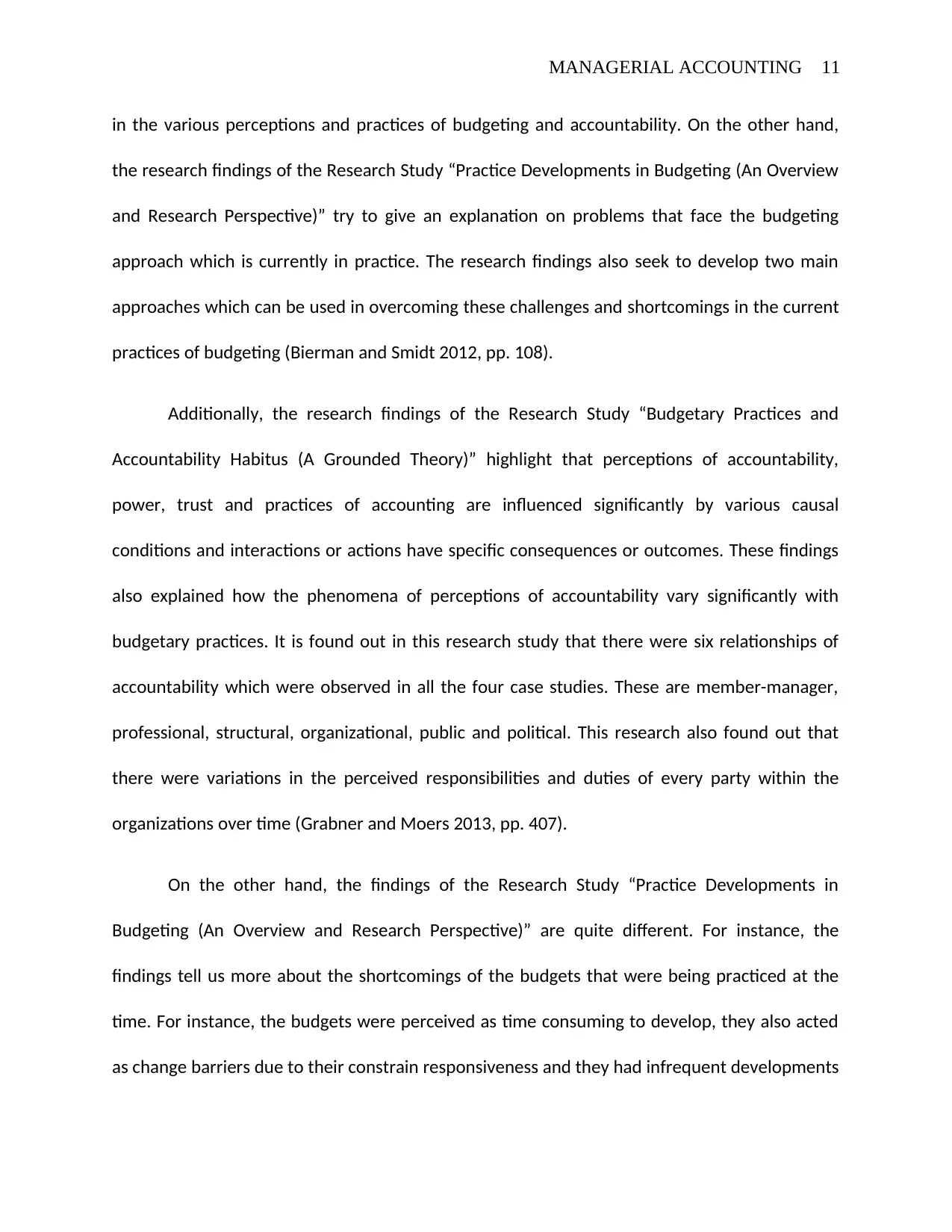
MANAGERIAL ACCOUNTING 11
in the various perceptions and practices of budgeting and accountability. On the other hand,
the research findings of the Research Study “Practice Developments in Budgeting (An Overview
and Research Perspective)” try to give an explanation on problems that face the budgeting
approach which is currently in practice. The research findings also seek to develop two main
approaches which can be used in overcoming these challenges and shortcomings in the current
practices of budgeting (Bierman and Smidt 2012, pp. 108).
Additionally, the research findings of the Research Study “Budgetary Practices and
Accountability Habitus (A Grounded Theory)” highlight that perceptions of accountability,
power, trust and practices of accounting are influenced significantly by various causal
conditions and interactions or actions have specific consequences or outcomes. These findings
also explained how the phenomena of perceptions of accountability vary significantly with
budgetary practices. It is found out in this research study that there were six relationships of
accountability which were observed in all the four case studies. These are member-manager,
professional, structural, organizational, public and political. This research also found out that
there were variations in the perceived responsibilities and duties of every party within the
organizations over time (Grabner and Moers 2013, pp. 407).
On the other hand, the findings of the Research Study “Practice Developments in
Budgeting (An Overview and Research Perspective)” are quite different. For instance, the
findings tell us more about the shortcomings of the budgets that were being practiced at the
time. For instance, the budgets were perceived as time consuming to develop, they also acted
as change barriers due to their constrain responsiveness and they had infrequent developments
in the various perceptions and practices of budgeting and accountability. On the other hand,
the research findings of the Research Study “Practice Developments in Budgeting (An Overview
and Research Perspective)” try to give an explanation on problems that face the budgeting
approach which is currently in practice. The research findings also seek to develop two main
approaches which can be used in overcoming these challenges and shortcomings in the current
practices of budgeting (Bierman and Smidt 2012, pp. 108).
Additionally, the research findings of the Research Study “Budgetary Practices and
Accountability Habitus (A Grounded Theory)” highlight that perceptions of accountability,
power, trust and practices of accounting are influenced significantly by various causal
conditions and interactions or actions have specific consequences or outcomes. These findings
also explained how the phenomena of perceptions of accountability vary significantly with
budgetary practices. It is found out in this research study that there were six relationships of
accountability which were observed in all the four case studies. These are member-manager,
professional, structural, organizational, public and political. This research also found out that
there were variations in the perceived responsibilities and duties of every party within the
organizations over time (Grabner and Moers 2013, pp. 407).
On the other hand, the findings of the Research Study “Practice Developments in
Budgeting (An Overview and Research Perspective)” are quite different. For instance, the
findings tell us more about the shortcomings of the budgets that were being practiced at the
time. For instance, the budgets were perceived as time consuming to develop, they also acted
as change barriers due to their constrain responsiveness and they had infrequent developments
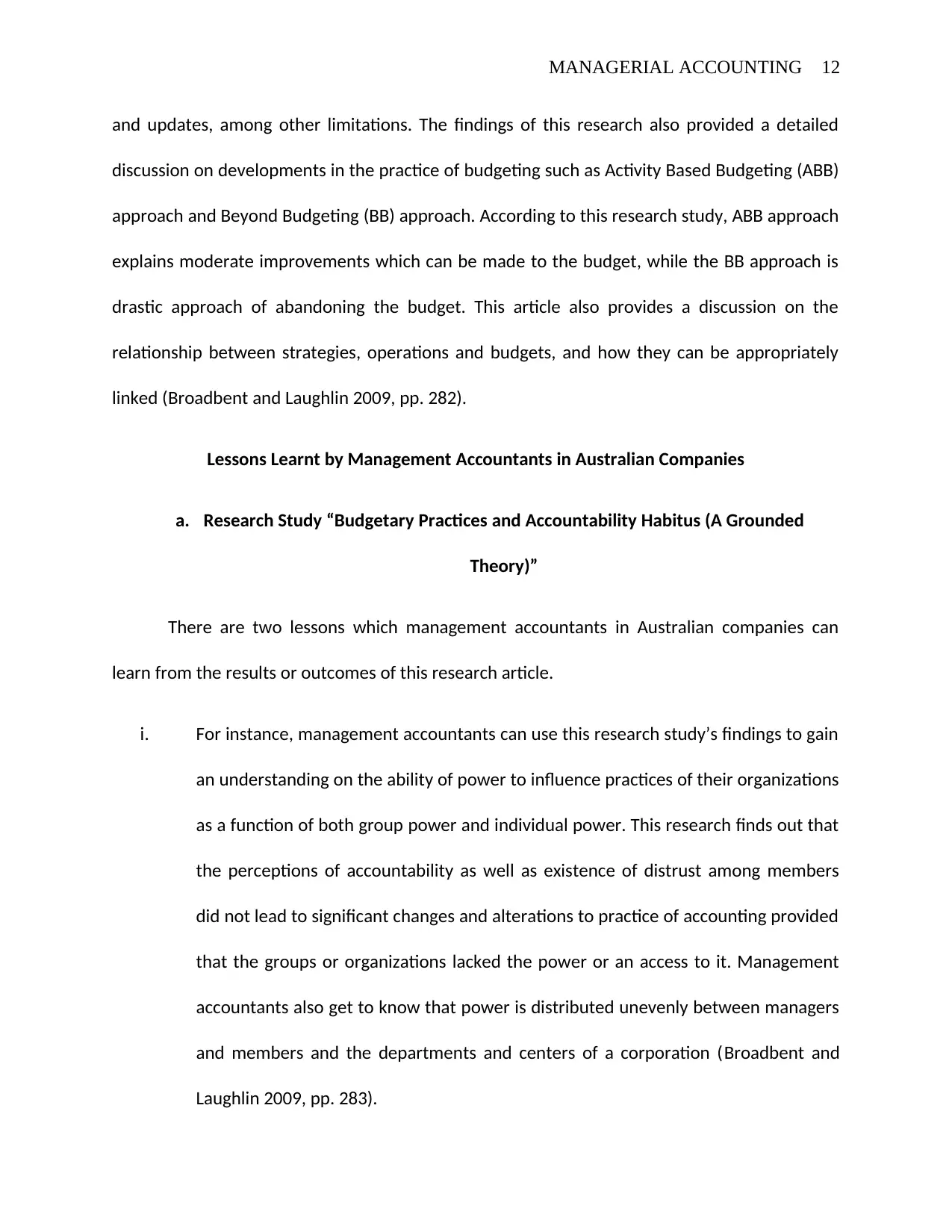
MANAGERIAL ACCOUNTING 12
and updates, among other limitations. The findings of this research also provided a detailed
discussion on developments in the practice of budgeting such as Activity Based Budgeting (ABB)
approach and Beyond Budgeting (BB) approach. According to this research study, ABB approach
explains moderate improvements which can be made to the budget, while the BB approach is
drastic approach of abandoning the budget. This article also provides a discussion on the
relationship between strategies, operations and budgets, and how they can be appropriately
linked (Broadbent and Laughlin 2009, pp. 282).
Lessons Learnt by Management Accountants in Australian Companies
a. Research Study “Budgetary Practices and Accountability Habitus (A Grounded
Theory)”
There are two lessons which management accountants in Australian companies can
learn from the results or outcomes of this research article.
i. For instance, management accountants can use this research study’s findings to gain
an understanding on the ability of power to influence practices of their organizations
as a function of both group power and individual power. This research finds out that
the perceptions of accountability as well as existence of distrust among members
did not lead to significant changes and alterations to practice of accounting provided
that the groups or organizations lacked the power or an access to it. Management
accountants also get to know that power is distributed unevenly between managers
and members and the departments and centers of a corporation (Broadbent and
Laughlin 2009, pp. 283).
and updates, among other limitations. The findings of this research also provided a detailed
discussion on developments in the practice of budgeting such as Activity Based Budgeting (ABB)
approach and Beyond Budgeting (BB) approach. According to this research study, ABB approach
explains moderate improvements which can be made to the budget, while the BB approach is
drastic approach of abandoning the budget. This article also provides a discussion on the
relationship between strategies, operations and budgets, and how they can be appropriately
linked (Broadbent and Laughlin 2009, pp. 282).
Lessons Learnt by Management Accountants in Australian Companies
a. Research Study “Budgetary Practices and Accountability Habitus (A Grounded
Theory)”
There are two lessons which management accountants in Australian companies can
learn from the results or outcomes of this research article.
i. For instance, management accountants can use this research study’s findings to gain
an understanding on the ability of power to influence practices of their organizations
as a function of both group power and individual power. This research finds out that
the perceptions of accountability as well as existence of distrust among members
did not lead to significant changes and alterations to practice of accounting provided
that the groups or organizations lacked the power or an access to it. Management
accountants also get to know that power is distributed unevenly between managers
and members and the departments and centers of a corporation (Broadbent and
Laughlin 2009, pp. 283).
⊘ This is a preview!⊘
Do you want full access?
Subscribe today to unlock all pages.

Trusted by 1+ million students worldwide
1 out of 19
Related Documents
Your All-in-One AI-Powered Toolkit for Academic Success.
+13062052269
info@desklib.com
Available 24*7 on WhatsApp / Email
![[object Object]](/_next/static/media/star-bottom.7253800d.svg)
Unlock your academic potential
Copyright © 2020–2025 A2Z Services. All Rights Reserved. Developed and managed by ZUCOL.




